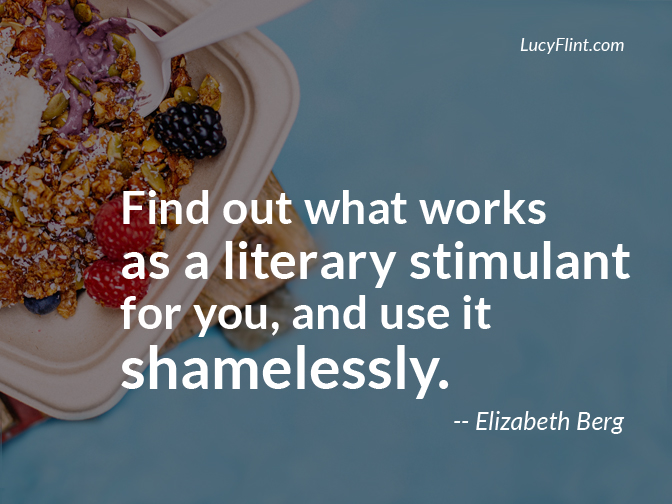Don't Skip This Essential Step Before Finding A Swoon-Worthy Idea
/So we're about midway through Idea Camp. Can you believe it?!
(Hey, June! Slow down!! Haha! ... Okay, but I'm serious. Slow down.)
We've covered a lot of awesome idea-generating tools so far: three topic lists that work incredibly well together (one and two and three), as well as a few idea scouting techniques (this one and this other one) that will absolutely get you some good results.
Whew!
Are your imaginations fizzing yet?
Today we're going to take a look at idea-finding from the opposite end.
This is one of the most important things you can do when you're in desperate need of the right idea, the perfect solution.
Define the problem.
Does it sound mundane? Boring? Obvious?
Ah, but don't be fooled. Don't underestimate this incredibly important step—like I used to.
Because sometimes, just doing this process of analyzing the problem will give you the exact perfect idea to solve it.
Whoa, right?
I can't tell you how many times I've hit a snag in my story, and then beat my brains up trying to figure out what to do next.
Maybe I've run into a problem with a character, a setting, or the conflict. I'll have backed my protagonist into a corner—and have zero ideas about what to do next.
It's great for story suspense, but pretty bad for my writing day.
So I used to make a lot of noise, growl at my computer screen, and rack my brains trying to come up with the idea I needed.
I spent a lot of time mentally spinning my tires, until I figured this out: That I needed a crystal clear definition of what problem I was trying to solve.
Sometimes we can come up with a good idea on impulse. But for the more complex, more elusive solutions, it pays to back off and take the time to study the problem itself.
It's tough to remember to do! Usually I just want to plug away until I have the solution I need.
But in order to design the right fix, you have to know exactly what you're looking for.
And you need to diligently uncover all the hidden requirements of the particular idea that you're after.
We can't solve anything until we're clear on exactly what we're solving!
My favorite way to "define the problem" is with a lot of informal freewriting.
Basically, I interview myself about exactly what's gone wrong. I'm looking for the most precise description of my problem, of the story snag, or the hole I'm trying to fill.
And then I take plenty of notes on my answers.
Writing it all down is key, because all your discussion with yourself about the problem is full of good clues: pointers to your needed idea!
Just remember: You're getting the exact dimensions of your missing puzzle piece. That's the only way to recognize the best solution.
Obviously, the questions that you ask yourself will look different depending on the idea that you're after. But the first place to start is by asking:
What exactly isn't working here? What is the problem really?
And then, go into detail.
Like, a lot of detail.
You really can't have too much detail! If you're an overthinker like me, just do your thing. Let it all out.
So, for me, I need to define the problem most often because I've hit a major snarl in my plot.
Like recently: I needed to figure out what my protagonist was going to do during a critical part of the climactic sequence. I knew what happened just before this moment, and I knew what happened just after.
But there was a big gap between the two, and I had nothing.
And after being frustrated for a while (stomping, staring, roaring), I remembered to start asking these questions.
I opened a new document on my computer, and I wrote it down: "I don't know how to get my protagonist into this important building at the end of the story."
And then I imagined my computer saying (in a calm, thoughtful voice): "Tell me more about that."
This is when you start discussing every single component of the problem.
So, for my problem, I wrote about who my protagonist was at this exact moment in the story.
What she had been learning, and what she was up against. How tired she was, and all the conflicts between herself and her allies. And also how she felt about the villains at the moment.
I also wrote down anything pertinent about her skills, her strengths, her flaws. What was her biggest fear? What was her chief objective, and what was the motive behind it?
I reviewed all of this good stuff. (Brilliant ideas are lurking in these kinds of questions!)
Then I thought through my other characters, and what they were doing during this exact moment in the plot.
And then, too, the antagonist and all his friends: What were they up to? What were they worried about? How were they gathering for the climactic scenes? What did they still have up their sleeves?
I took a zillion notes, and then sat back and kept thinking.
What else was part of the problem?
Well, the building she needed to get into: it was extremely important to the story, and it had some special plot-related requirements of its own.
So I wrote down everything that I could think of about that.
And then I thought through everything else going on in the story's setting: the surrounding area, and the weather, and anything else that could be a part of it.
Another great question if you're looking at a plot problem: What story resources are still untapped?
What about these characters have I not used in a while? What haven't I exploited about the setting?
See how it goes?
The main thing is to drill wide, and drill deep.
And don't stop until you feel like you have the most accurate representation of the hole you need to fill.
Also, you can take some time to explain why other solutions don't work.
This can be really clarifying. It's also a little cathartic, since you've probably had to abandon a handful of ideas for certain reasons. Get all that down, so that you know where you are:
I can't do this, because of that and that and that. I can't do this other thing, because of x and y and z.
Then ask:
What else will the solution have to take into consideration?
What other constraints are you operating with?
And (since sometimes you're filling a gap, and you know what's on the other side of it) what will this solution have to lead into?
Whew!
After I've written everything down—and then some!—I'll usually take a break from this "Defining the Problem Q&A."
I'll come back a few hours later, or the next day, and reread all the scribbling I've done and see if I've left anything out.
Once you've gotten every single possible element of your problem onto paper, you're set. Good job!
You have just become the expert on the idea that you're looking for.
So where does that leave you?
Actually in a really good place.
When I did this process for that climactic story snag I had? The exact perfect solution dropped into my head, while I was writing down all the things that wouldn't work.
It feels like magic when that happens! Like "Congrats, you're a genius!!"
The right solution fell into place, and I love it. It feels unexpected in the story (I think!), and it ties up all the concerns I had about the moment itself.
But there's no way I would have been clear on that, if I hadn't gone through this process.
If the perfect idea doesn't show up, at least you know exactly what you are looking for. And that's a powerful place to be, when you need the perfect idea!
So how do you go about finding it?
That's what we'll talk about in the next post.
Ooooh. Story problems: brace yourselves!!

















